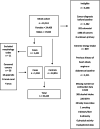Intake of polyphenols from cereal foods and colorectal cancer risk in the Melbourne Collaborative Cohort Study
- PMID: 37702114
- PMCID: PMC10557875
- DOI: 10.1002/cam4.6514
Intake of polyphenols from cereal foods and colorectal cancer risk in the Melbourne Collaborative Cohort Study
Abstract
Background: Cereal-derived polyphenols have demonstrated protective mechanisms in colorectal cancer (CRC) models; however, confirmation in human studies is lacking. Therefore, this study examined the association between cereal polyphenol intakes and CRC risk in the Melbourne Collaborative Cohort Study (MCCS), a prospective cohort study in Melbourne, Australia that recruited participants between 1990 and 1994 to investigate diet-disease relationships.
Methods: Using food frequency questionnaire diet data matched to polyphenol data, dietary intakes of alkylresorcinols, phenolic acids, lignans, and total polyphenols from cereals were estimated. Hazard ratios (HRs) and 95% confidence intervals for CRC risk were estimated for quintiles of intake with the lowest quintile as the comparison category, using multivariable adjusted Cox proportional hazards models with age as the time axis adjusted for sex, socio-economic status, alcohol consumption, fibre intake, country of birth, total energy intake, physical activity and smoking status.
Results: From 35,245 eligible adults, mean (SD) age 54.7 (8.6) years, mostly female (61%) and Australian-born (69%), there were 1394 incident cases of CRC (946 colon cancers and 448 rectal cancers). Results for total cereal polyphenol intake showed reduced HRs in Q2 (HR: 0.80; 95% CI, 0.68-0.95) and Q4 (HR: 0.75; 95% CI, 0.62-0.90), and similar for phenolic acids. Alkylresorcinol intake showed reduced HR in Q3 (HR: 0.80; 95% CI, 0.67-0.95) and Q4 (HR: 0.79; 95% CI, 0.66-0.95).
Conclusions: Overall, the present study showed little evidence of association between intakes of cereal polyphenols and CRC risk. Future investigations may be useful to understand associations between cereal-derived polyphenols and additional cancers in different populations.
Keywords: Melbourne Collaborative Cohort Study; cereals; colorectal cancer; food frequency questionnaire; polyphenols.
© 2023 The Authors. Cancer Medicine published by John Wiley & Sons Ltd.
Conflict of interest statement
The authors have no conflict of interest to disclose.
Figures
Similar articles
-
Polyphenols in Cereals: State of the Art of Available Information and Its Potential Use in Epidemiological Studies.Nutrients. 2024 Jul 6;16(13):2155. doi: 10.3390/nu16132155. Nutrients. 2024. PMID: 38999902 Free PMC article. Review.
-
Estimated dietary intake of polyphenols from cereal foods and associated lifestyle and demographic factors in the Melbourne Collaborative Cohort Study.Sci Rep. 2023 May 26;13(1):8556. doi: 10.1038/s41598-023-35501-0. Sci Rep. 2023. PMID: 37237174 Free PMC article.
-
Dietary polyphenols and colorectal cancer risk: the Fukuoka colorectal cancer study.World J Gastroenterol. 2013 May 7;19(17):2683-90. doi: 10.3748/wjg.v19.i17.2683. World J Gastroenterol. 2013. PMID: 23674876 Free PMC article.
-
Dietary polyphenols and the risk of colorectal cancer in the prospective Southern Community Cohort Study.Am J Clin Nutr. 2022 Apr 1;115(4):1155-1165. doi: 10.1093/ajcn/nqac012. Am J Clin Nutr. 2022. PMID: 35044416 Free PMC article.
-
Polyphenol exposure and risk of type 2 diabetes: dose-response meta-analyses and systematic review of prospective cohort studies.Am J Clin Nutr. 2018 Jul 1;108(1):49-61. doi: 10.1093/ajcn/nqy083. Am J Clin Nutr. 2018. PMID: 29931039
Cited by
-
Polyphenols in Cereals: State of the Art of Available Information and Its Potential Use in Epidemiological Studies.Nutrients. 2024 Jul 6;16(13):2155. doi: 10.3390/nu16132155. Nutrients. 2024. PMID: 38999902 Free PMC article. Review.
-
Dietary Polyphenols: Luteolin, Quercetin, and Apigenin as Potential Therapeutic Agents in the Treatment of Gliomas.Nutrients. 2025 Jul 1;17(13):2202. doi: 10.3390/nu17132202. Nutrients. 2025. PMID: 40647306 Free PMC article. Review.
References
-
- Sharma R, Abbasi‐Kangevari M, Abd‐Rabu R, et al. Global, regional, and national burden of colorectal cancer and its risk factors, 1990–2019: a systematic analysis for the Global Burden of Disease Study 2019. The Lancet Gastroenterology & Hepatology. 2022;7(7):627‐647. doi:10.1016/S2468-1253(22)00044-9 - DOI - PMC - PubMed
Grants and funding
LinkOut - more resources
Full Text Sources


